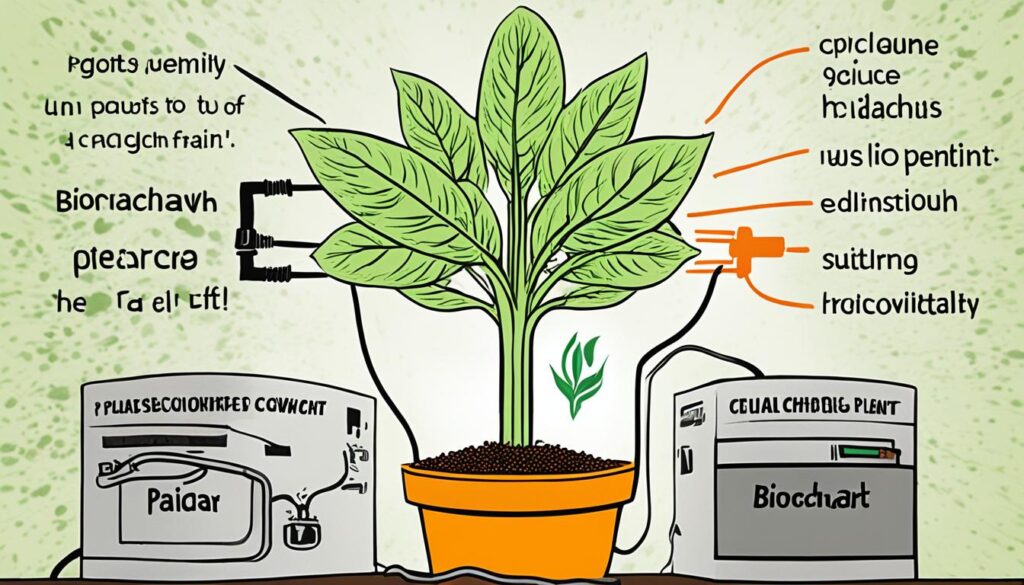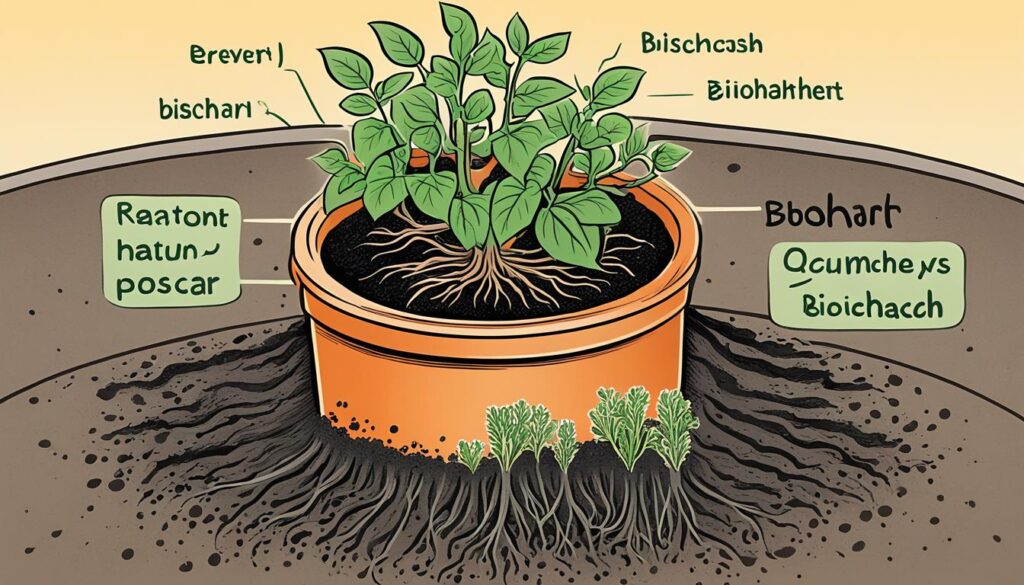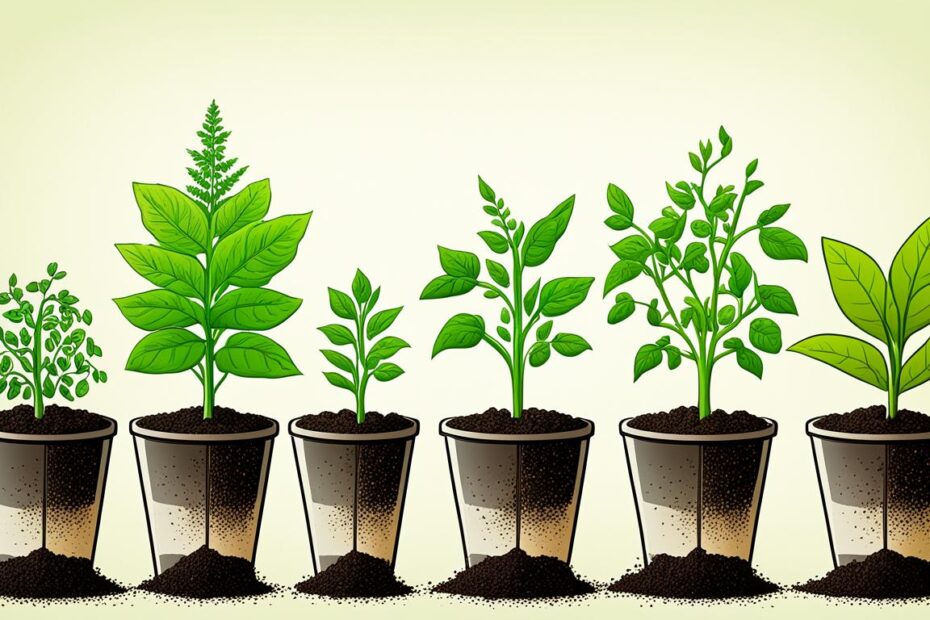Are you looking for a way to supercharge your plants’ growth and boost the health of your potting soil? Consider adding biochar! This highly beneficial soil amendment has the power to enhance fertility, retain nutrients, and prevent water leaching, resulting in optimal plant growth. But how much biochar should you add to your potting soil to achieve these benefits?
In this article, we will delve into the science behind biochar and reveal the optimal amount to add to your potting soil. Discover how biochar can transform your garden, improve nutrient availability, and unlock your plants’ full potential. Get ready to enhance your gardening game and optimize growth like never before!
Key Takeaways:
- Biochar is a highly valuable soil amendment that can benefit potting soil and plant growth.
- The right amount of biochar in potting soil can optimize plant growth by improving fertility and nutrient availability.
- By adding biochar to your potting soil, you can prevent water leaching and retain essential nutrients for your plants.
- Incorporating biochar properly into potting soil is key to unlocking its full potential and reaping its benefits.
- Stay tuned to learn the science-backed recommendations on how much biochar to add to your potting soil to optimize growth.
Incorporating Biochar into Soil and Compost
To maximize the benefits of biochar, it is essential to incorporate it properly into soil and compost. By following these guidelines, you can ensure that biochar becomes an integral part of your gardening routine, enriching your soil and enhancing plant growth.
Incorporating Biochar into Soil:
When adding biochar to soil, it is important to distribute it evenly throughout the planting area. This allows for uniform nutrient availability and water retention. Follow these steps to incorporate biochar into your soil:
- Prepare the soil by loosening it to a depth of 6-12 inches.
- Add the recommended amount of biochar based on the application rate (5-10% biochar by volume) and desired outcome.
- Mix the biochar thoroughly with the soil using a garden fork or tiller.
- Rake the soil to achieve a smooth surface for planting.
By incorporating biochar into your soil, you can improve its structure, water-holding capacity, and nutrient retention, ultimately promoting healthier plant growth.
Using Biochar in Compost:
Biochar can also be a valuable addition to compost, further enhancing its nutrient content and microbial activity. Follow these steps to incorporate biochar into your compost:
- Collect organic materials such as kitchen scraps, yard waste, and other compostable materials.
- Shred or chop the materials into smaller pieces for better composting.
- Add the recommended amount of biochar (usually 5-10% by volume) to the compost pile.
- Thoroughly mix the biochar with the other compostable materials.
- Turn the compost pile regularly to ensure proper decomposition and aeration.
- Allow the compost to mature for several months before using it in your garden.
The incorporation of biochar into compost enriches the organic matter with enhanced nutrient-holding capacity, promoting the growth of healthier plants.
Remember! Pre-soaking biochar before adding it to soil or compost can improve its water retention capabilities. Simply submerge the biochar in water for a few hours or overnight, allowing it to absorb moisture before application.
By incorporating biochar into your soil and compost, you can harness its numerous benefits and optimize the growth of your plants. The following table provides an overview of recommended biochar application rates based on soil type:
| Soil Type | Biochar Application Rate |
|---|---|
| Sandy Soil | 5-10% by volume |
| Loam Soil | 7-10% by volume |
| Clay Soil | 10-15% by volume |
| Other Soil Types | Varies based on soil composition and crop requirements |
Charging Up Your Soil with Biochar
Charging biochar is an essential step in harnessing its full potential to improve soil fertility and boost plant growth. By inoculating biochar with nutrients and soil microorganisms, you can create a thriving ecosystem in your soil that supports the health and vitality of your plants.
There are various methods you can use to charge biochar and enhance its beneficial properties. One approach is to introduce a wide variety of nutrients to the biochar, such as plant-based fertilizers or organic amendments rich in essential elements. This ensures that the biochar is imbued with the necessary nutrients that your plants require for optimal growth and development.
Another effective method is to inoculate the biochar with compost or other microbial sources. Compost is an excellent medium for introducing a diverse range of beneficial microorganisms to the biochar. These microbes work symbiotically with the plants, forming a mutually beneficial relationship where the plants receive essential nutrients, and the microbes thrive in the biochar, improving soil structure and fertility.
The charging process typically takes at least 14 days to allow the beneficial soil biology to establish and flourish. During this time, the nutrients and microorganisms gradually colonize the biochar, transforming it into a powerhouse of fertility. It’s essential to tailor the charging method to suit your specific application, taking into account the particular needs of your soil and plants.
The Benefits of Blending Biochar with Compost
“Blending biochar with a high-quality compost that contains beneficial microbiology is a common approach to charging biochar.”
One widely employed technique is to blend biochar with a high-quality compost that already contains beneficial microbiology. This method combines the benefits of both biochar and compost, creating a synergistic effect that enhances soil fertility and promotes plant growth.
The biochar acts as a long-term reservoir, retaining nutrients and moisture in the soil, while the compost provides an immediate source of organic matter and microorganisms. Together, they create an ideal environment for plants to thrive, ensuring a steady supply of essential nutrients, improved water retention, and increased soil biodiversity.
To charge biochar using this approach, simply mix it thoroughly with the compost, ensuring even distribution throughout the mixture. This can be done manually or using a mechanical mixer. The resulting blend can then be applied directly to the soil or incorporated into potting mixes or garden beds.
To get the most out of this charging method, it’s important to use a high-quality compost that contains diverse microbial populations. This ensures that the biochar is enriched with a wide range of beneficial microorganisms that can aid in nutrient cycling, disease suppression, and overall soil health.
| Benefits of Blending Biochar with Compost | Benefits of Charging Biochar |
|---|---|
| Enhances soil fertility | Retains nutrients in the soil |
| Improves water retention | Increases nutrient availability |
| Boosts soil biodiversity | Promotes beneficial soil biology |
| Aids in disease suppression | Enhances soil structure |
The combination of biochar and compost provides a holistic solution for charging biochar and maximizing its benefits. Through proper charging, you can supercharge your soil with biochar, creating an environment where plants can thrive and reach their full potential.

Incorporating Biochar into Potting Mixes and Garden Beds
Are you looking to optimize plant growth and improve the quality of your potting soil and garden beds? Incorporating biochar can be a game-changer. Biochar is a highly beneficial soil amendment that can enhance soil structure, increase nutrient availability, and promote healthier plant growth. Let’s explore how you can effectively incorporate biochar into your potting mixes and garden beds.
To achieve optimal results, it is important to determine the right ratio of biochar to be added. The recommended ratio is 10-20% biochar by volume. However, you can adjust this ratio based on your specific plant requirements, soil type, and desired outcomes. Keep in mind that different plants may have varying needs, so experimenting with different ratios can help you find the perfect balance.
When adding biochar to your potting mixes or garden beds, it is crucial to ensure proper distribution. Uniformity is key to maximize the benefits of biochar throughout the soil. By uniformly dispersing biochar, you can create a nutrient-rich environment that promotes healthy root development and enhances overall plant growth.
Pre-soaking Biochar for Enhanced Water-Holding Capacity
Pre-soaking biochar before adding it to your potting soil or garden beds can significantly improve its water-holding capacity. By pre-soaking, you allow biochar to absorb water, enhancing its ability to retain moisture and prevent water loss through leaching. This can be particularly beneficial in drought-prone areas or if you have plants that require more water. Simply submerge the biochar in water for a few hours before mixing it with your potting mix or incorporating it into the soil.
Combining biochar with organic matter, such as compost or aged manure, can further enrich the soil. This combination creates a nutrient-rich environment that is conducive to healthy plant growth. The organic matter acts as a source of essential nutrients while biochar enhances nutrient availability by preventing nutrient leaching and immobilization.
To visually demonstrate the recommended biochar ratio and the benefits of pre-soaking biochar, the following table outlines the steps to incorporate biochar into potting mixes and garden beds:
| Steps | Description |
|---|---|
| 1. | Determine the desired biochar ratio based on plant requirements, soil type, and desired outcomes. |
| 2. | Pre-soak biochar in water for a few hours to enhance its water-holding capacity. |
| 3. | Mix biochar with potting soil or garden bed soil, ensuring uniform distribution. |
| 4. | Combine biochar with organic matter, such as compost or aged manure, to create a nutrient-rich mixture. |
| 5. | Incorporate the biochar-enriched mixture into potting mixes or spread it evenly in garden beds. |
By following these steps and incorporating biochar into your potting mixes and garden beds, you can create an optimal environment for your plants to thrive.
Image:
The Best Place to Put Biochar
When it comes to utilizing biochar, the optimal location depends on its intended application. For incorporating biochar as a soil amendment, the key is to incorporate it into the plant’s root zone. By doing so, you can ensure that the biochar is placed where it can have the most significant impact on plant growth and overall soil health.
Ideally, biochar should be incorporated to a depth of 4-6 inches within the root zone. This depth allows the biochar to interact with plant roots, maximizing its benefits in terms of water holding, nutrient retention, and providing a habitat for beneficial soil biology.
However, it’s important to note that biochar can also be used for other purposes beyond soil amendment. For stormwater purification or erosion control, biochar can be strategically placed in specific locations, such as landscape socks or filtration systems. This allows biochar to play a role in capturing pollutants and improving water quality.

Key Takeaways:
- Incorporate biochar into the plant’s root zone for optimal soil amendment benefits.
- A depth of 4-6 inches is ideal for incorporating biochar into the root zone.
- Biochar can be strategically placed in landscape socks or filtration systems for stormwater purification or erosion control.
Best Management Practices when Applying and Storing Biochar
Ensuring proper handling and storage of biochar is crucial to minimize risks and maximize its benefits. By following the best practices outlined below, you can safely and effectively manage biochar in your gardening or agricultural endeavors.
1. Personal Protective Equipment
When handling biochar, it is essential to prioritize your safety. Wearing personal protective equipment (PPE) is a crucial step in preventing any potential health hazards. Equip yourself with gloves and safety glasses to protect your hands and eyes from direct contact with biochar particles.
2. Dust Control Measures
Biochar particles can be fine and dusty, making it necessary to implement dust control measures. Minimize the risk of inhaling these particles by wetting down biochar before handling, applying, or incorporating it into the soil. This will help reduce the dispersion of airborne particles and promote a safer environment for both you and the surrounding area.
3. Storage Guidelines
Proper storage of biochar is essential to maintain its quality and prevent any unexpected incidents. Follow these guidelines to ensure optimal biochar storage:
- Store biochar in a dry area to prevent moisture absorption, which can reduce its efficacy.
- Ensure the storage area is well-ventilated to prevent the buildup of potentially hazardous gases.
- Avoid storing biochar near flammable materials or heat sources to prevent fire hazards.
- Regularly inspect the storage area for any signs of damage or deterioration.
4. Fire Safety Precautions
Biochar is generally non-flammable, but it’s important to exercise caution and follow fire safety precautions. Keep a fire extinguisher nearby in case of emergencies and familiarize yourself with proper fire extinguishing techniques. Stay vigilant by avoiding the storage of biochar in areas prone to fire risks.
5. Training and Education
“The more you know, the safer you’ll be.”
To ensure the safe handling and storage of biochar, it’s crucial to provide proper training and education to individuals who will be working with it. Promote a culture of safety by disseminating information about best practices, potential risks, and emergency protocols. By empowering individuals with knowledge, you create a safer environment for everyone involved.
Implementing these best management practices will help you handle and store biochar responsibly, reducing potential risks and maximizing the benefits it offers to your soil and plants.
CLICK HERE TO CHECK OUR RECOMMENDED PRODUCTSConclusion
Discover the numerous benefits of biochar in optimizing plant growth and enhancing your potting soil. Incorporating biochar into your soil, compost, or potting mixes can significantly improve soil fertility, nutrient availability, and water retention. By following best management practices for biochar handling, storage, and application, you can ensure safety and maximize its benefits.
When it comes to biochar application, there is no one-size-fits-all approach. The recommended application rates and methods may vary based on your specific requirements. Experiment with different ratios and incorporate biochar to a depth of 6-12 inches in the soil. Pre-soaking biochar before application can enhance its water-holding capacity.
Unlock the full potential of your plants by harnessing the power of biochar. Whether you are a gardening enthusiast, a farmer, or simply someone who loves plants, biochar can be your secret ingredient for success. Optimize growth, improve soil health, and reap the rewards of a thriving garden with biochar. Start enhancing your potting soil and plant growth today!
FAQ
How much biochar should I add to my potting soil?
The recommended ratio is 5-10% biochar by volume as a starting point. However, the exact amount may vary based on factors such as soil type, desired outcome, and specific crop requirements.
How do I incorporate biochar into soil?
Mix the biochar evenly into the soil to a depth of 6-12 inches. This ensures proper distribution and allows for better water retention and nutrient availability.
Can I use biochar in compost?
Yes, blending biochar with other organic materials, such as kitchen scraps or yard waste, can create a nutrient-rich compost. This can be achieved by mixing biochar with the organic matter during the composting process.
How do I charge biochar?
Biochar can be charged by introducing a variety of nutrients and inoculating it with compost or other microbial sources. The charging process typically takes at least 14 days to allow beneficial soil biology to establish and improve soil fertility.
What is the optimal ratio of biochar in potting mixes?
The recommended ratio is 10-20% biochar by volume, but it can be adjusted based on plant requirements, soil type, and desired outcomes. Pre-soaking biochar before incorporation can enhance its water-holding capacity.
Where should I place biochar in my garden?
If used as a soil amendment, it should be incorporated into the plant’s root zone, ideally to a depth of 4-6 inches. This ensures maximum benefits in terms of water holding, nutrient retention, and hosting beneficial soil biology. However, biochar can also be used for stormwater purification or erosion control in specific locations such as landscape socks or filtration systems.
How should I handle and store biochar?
It is important to wear personal protective equipment, such as gloves and safety glasses, when handling biochar. Dust control measures should be taken to minimize inhalation of fine particles. Biochar should be stored in a dry and well-ventilated area, away from flammable materials and heat sources. Regular inspections of the storage area are recommended, and fire safety precautions should be followed.
What are the benefits of using biochar in potting soil?
Incorporating biochar into potting soil can greatly enhance plant growth, soil structure, and nutrient availability. It improves fertility, water retention, and prevents leaching of water and nutrients. Additionally, biochar promotes the growth of beneficial soil microorganisms, leading to healthier plants and increased yields.
